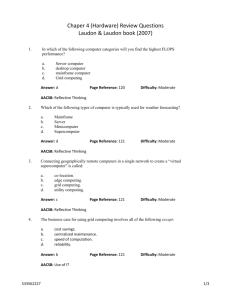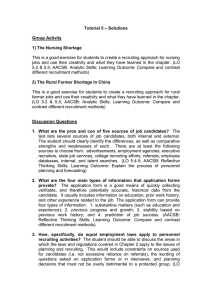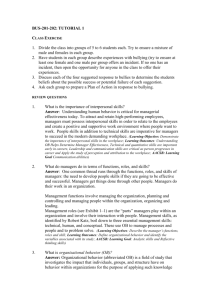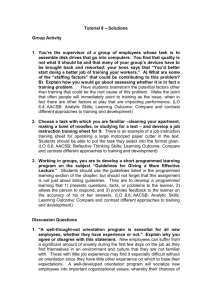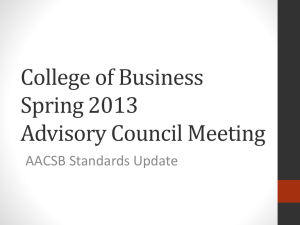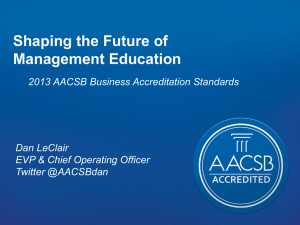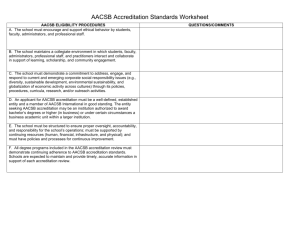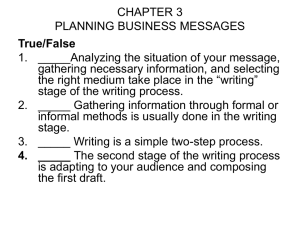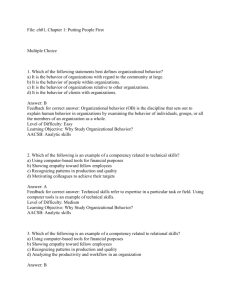- Chap 4 Jeopardy Review
advertisement
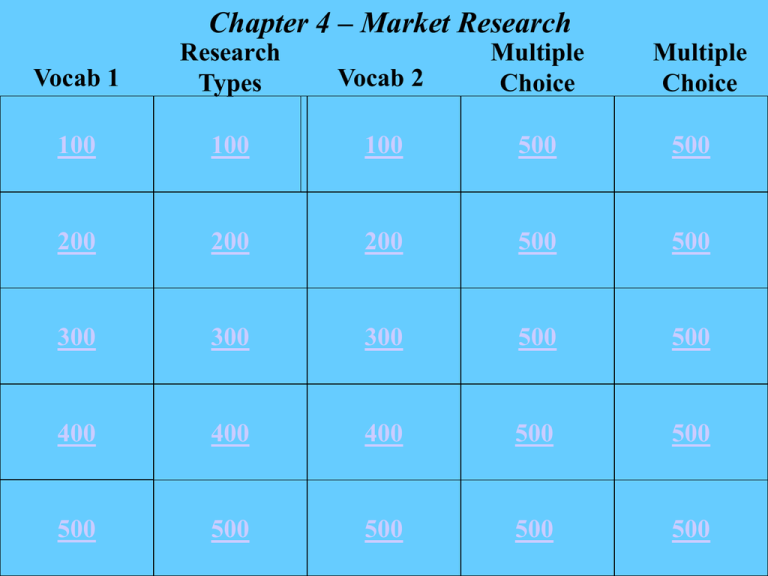
Chapter 4 – Market Research
Vocab 1
Research
Types
Vocab 2
Multiple
Choice
Multiple
Choice
100
100
100
100
100
100
500
100
100
100
500
200
200
200
500
500
300
300
300
500
500
400
400
400
500
500
500
500
500
500
500
Information that already exists
somewhere, having been collected
for another purpose.
Secondary Data
Information collected for the
specific purpose at hand.
Primary Data
A segment of the population selected
for marketing research to represent the
population as a whole.
Sample
Managing detailed information
about individual customers and
carefully managing customer
“touch points” in order to
maximize customer loyalty.
CRM – Customer Relationship Management
People and procedures for assessing
information needs, developing the
needed information, and helping decision
makers to use the information to
generate and validate actionable
customer and market insights.
MIS – Marketing Information
System
Gathering primary data by
observing relevant people,
actions, and situations.
Observational Research
Marketing research to gather
preliminary information that will
help define problems and suggest
hypotheses.
Exploratory Research
Gathering primary data by selecting
matched groups of subjects, giving them
different treatments, controlling related
factors, and checking for differences in
group responses
Experimental Research
Marketing research to better
describe marketing problems,
situations, or markets, such as
the market potential for a
product of the demographics
and attitudes of consumers
Descriptive Research
Marketing research to test hypotheses
about cause and effect relationships.
Casual Research
The systematic design, collection,
analysis and reporting of data relevant to
a specific marketing situation facing an
organization.
Marketing Research
Computerized collections of
information available from online
commercial sources or via the
internet.
Commercial Online Databases
Collecting primary data online through
internet surveys, online focus groups,
Web-based experiments or tracking
consumers online behavior.
Online Marketing Research
A form of observational research that
involves sending trained observers to
watch and interact with consumers in
their “natural habitat.”
Ethnographic Research
Gathering primary data by asking
people questions about their
knowledge, attitudes, preferences
and buying behavior.
DAILY DOUBLE
Survey Research
Despite the data glut that marketing
managers receive, they frequently
complain that they lack ________.
a. enough information of the right kind
b. quality information
c. timely information
d. accurate and reliable information
e. valid information
(a; p. 97; Easy) {AACSB:
Communication}
_____ is the systematic collection and
analysis of publicly available information
about consumers, competitors, and
developments in the marketing environment.
a. Marketing data
b. Marketing intelligence
c. Web Master
d. Sales and sales management
e. Secondary data
(b; p. 100; Easy)
Information collected from online databases
on the Internet is an example of ________
data.
primary
secondary
observational
experimental
ethnographic
(b; p. 103; Moderate) {AACSB: Use of
IT}
Secondary data are ________.
a. collected mostly via surveys
b. expensive to obtain
c. sometimes not accurate
d. never purchased from outside
suppliers
e. always necessary to support or refute
the primary data collected
(c; p. 105; Moderate)
Your marketing department is attempting to
improve strategic decision making, track
competitors’ actions, and provide early warning
of opportunities and threats. Your department
would do well to use ________.
a.
internal databases
b. external databases
c.
marketing intelligence
d. the Internet
e.
company reports only
(c; p. 100; Challenging) {AACSB:
Reflective Thinking}
Diana Dion is currently researching data
sources from within her company to make
marketing decisions. Diana is making use of
________ databases.
a.
external
b. current
c.
historical
d. internal
e.
foreign
(d; p. 99; Easy) {AACSB: Reflective
Thinking}
Small organizations can obtain, with
minimal effort, most of which type of
data available to large businesses?
a. census
b. observational
c. secondary
d. primary
e. business
(c; p. 119; Moderate)
Which method could a marketing
researcher use to obtain information that
people are unwilling or unable to
provide?
a.
observational research
b. focus groups
c.
personal interviews
d. Internet surveys
e.
questionnaires
(a; p. 106; Easy) {AACSB:
Communication}
Typically, customer information is buried deep in
separate databases, plans, and records of many
different company functions and departments. To
overcome such problems, which of the following could
you try?
a.
customer satisfaction measurement
b.
more sophisticated software
c.
customer relationship management
d.
synergetic meetings of the minds
e.
less marketing intelligence
DAILY DOUBLE
(c; p. 114; Moderate) {AACSB: Use
of IT}
Harvard University is systematically designing,
collecting, analyzing, and reporting data in order
to market its programs to minority students.
What do we call this?
a.
promotion
b. self-study
c.
marketing research
d. cost-benefit analysis
e.
Identifying the target market
(c; p. 102; Challenging)
{AACSB: Reflective Thinking}

